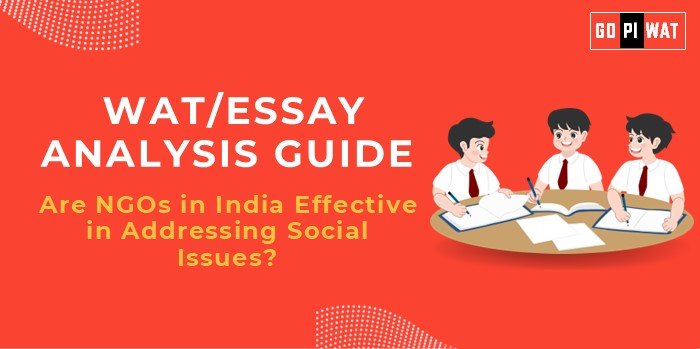📋 Are NGOs in India Effective in Addressing Social Issues?
🌐 Understanding the Importance of NGOs’ Effectiveness in India
NGOs in India are essential for social welfare, filling gaps that government bodies alone cannot address. For B-school applicants, analyzing NGOs offers insights into social entrepreneurship, public policy, and corporate social responsibility—relevant fields in today’s socially conscious corporate landscape.
⏳ Effective Planning and Writing
- 🕒 Time Allocation: Spend 5 minutes on planning, 20 minutes on writing, and 5 minutes reviewing.
- 📚 Preparation Tips: Familiarize yourself with key statistics, primary challenges, and exemplary case studies of NGOs that have made substantial impacts.
✍️ Introduction Techniques for Essays
- ⚖️ Contrast Introduction: “While India has over 3 million NGOs actively involved in addressing social issues, the challenges they face often limit their overall impact.”
- 📜 Historical Introduction: “Since the post-independence era, NGOs have been at the forefront of social issues in India, serving as both advocates and service providers for marginalized communities.”
- 💡 Problem-Solution Introduction: “With limited resources and challenging regulatory frameworks, NGOs in India face a pressing need for sustainable models that ensure long-term social impact.”
📖 Structuring the Essay Body
- 🏆 Achievements: Highlight areas where NGOs have succeeded, like health (e.g., tuberculosis awareness), education (e.g., rural literacy programs), and environmental conservation (e.g., pollution reduction efforts).
- 🔍 Challenges with Comparative Analysis: Discuss funding instability and regulatory obstacles, comparing India’s NGO landscape with countries where NGOs receive consistent support and clearer regulatory frameworks.
- 🌟 Future Outlook: Suggest ways forward, such as partnerships with corporates for steady CSR funding, streamlined regulations, and enhanced impact measurement standards.
🔗 Concluding Effectively
- ⚖️ Balanced Conclusion: “While NGOs in India contribute significantly to social welfare, enhancing their effectiveness requires better funding structures, reduced bureaucratic challenges, and standardized impact metrics.”
- 🌍 Global Comparison Conclusion: “Learning from models in developed nations, India’s NGOs could benefit from structured regulatory frameworks and funding transparency, boosting their effectiveness.”
📊 Analyzing Successes and Shortcomings
- ✅ Key Achievements: NGOs have advanced health, education, and environmental initiatives, often reaching communities that government programs cannot.
- ⚠️ Ongoing Challenges: Financial dependency, regulatory burdens, and lack of measurable impact hinder consistent success.
- 🌏 Global Context: Countries like the USA offer more NGO support through tax incentives, showcasing a supportive model India could emulate.
💡 Recommendations for Sustainable Progress
- 📢 Stable Funding Models: Encourage CSR funding commitment and diversify funding sources to reduce dependency on government grants.
- 🛡️ Policy Simplification: Advocate for streamlined regulatory compliance to facilitate NGO operations and accountability.
- 📏 Impact Measurement: Develop standardized metrics to assess NGO outcomes, improving transparency and effectiveness.
✍️ Sample Short Essays on NGO Effectiveness
- ⚖️ Balanced Perspective: “NGOs in India play a crucial role in addressing social issues but face funding and regulatory challenges that limit their potential. Improved funding models and clear regulations could enhance their impact.”
- 🔍 Solution-Oriented: “The effectiveness of NGOs in India can be significantly boosted with stable CSR funding and simplified regulations, allowing them to scale their impact on marginalized communities.”
- 🌍 Global Comparison: “Unlike in the USA, where NGOs receive robust support through tax benefits, Indian NGOs face financial and regulatory challenges, making reforms essential for maximizing their social impact.”


